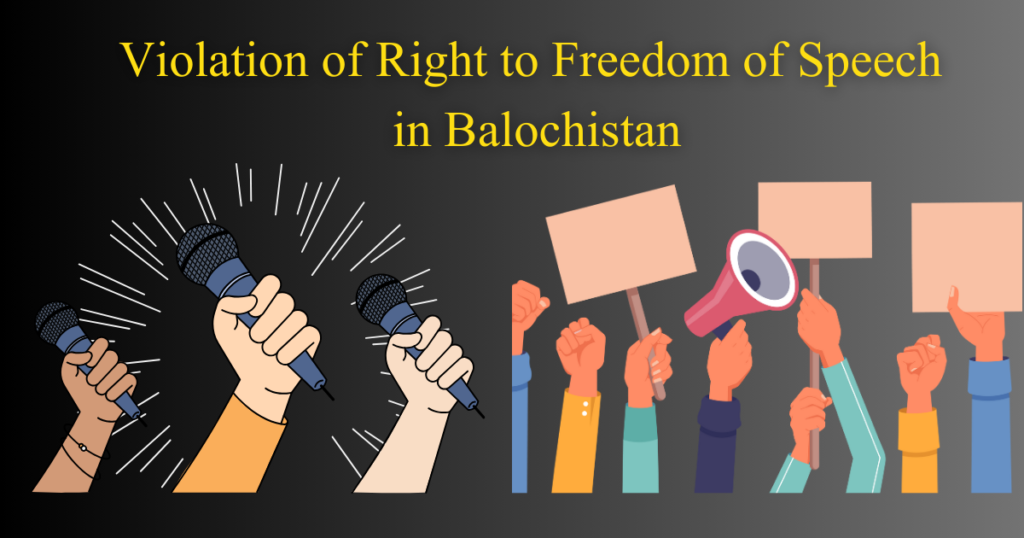
Globally and across other provinces of Pakistan, whispers of Balochistan’s vast freedom circulate. However, the reality is that Balochistan has been deprived of every kind of freedom since the very first day of its decision to emerge in Pakistan.
Freedom of Speech
One of the inherited fundamental rights is ‘Freedom of Speech and Expression’ since the birth of mankind. It came under the legal umbrella of various treaties, charters, conventions, and constitutions, of the world. Further glorified and enshrined as Article 19 of the Constitution of the Islamic Republic of Pakistan, 1973 with some limitations and restrictions. It struck a balance between ‘freedom and diversity in society’ in terms of faith, belief, and religion, otherwise, the unbridled freedom may create disorder and chaos in the society.
These “reasonable” restrictions are often exploited against mostly Balochistan province and different groups of people such as minorities, journalists, human rights activists, atheists, homosexuals, etc.
They are interpreted as a freedom to disregard others’ faiths ideology, or perceptions. They produce outcasts. Status quo and ruling alliances, liberty-fearing and frustrated people led by radical, obscurantist, or manipulative clerics, all acting in the name of so-called decency, build a wall around these fabricated pariahs and silence them.
As a global phenomenon, terrorism is considered the unlawful use of force or violence against individuals, groups, or societies to achieve political or social goals. The cruel ruling eras and dictatorial regimes ended with the legislation of the 1973 Constitution. But in the name of counter-terrorism, Pakistani security forces are increasingly exercising press censorship and impeding the reporting of human rights violations and signed conventions like the ICCPR and ICESCR in Balochistan. Despite Article 19, the speech rights are not upheld in Balochistan.
The COAS said those who flout the clear restrictions imposed on freedom of expression as enshrined in the Constitution, cannot point fingers at others. “We are well aware of our constitutional limits and expect others to uphold the Constitution,”.
Citizens and journalists in Balochistan are caught between the devil and the deep blue sea. Both insurgents and security forces target Balochistan reporters. National-level news channels and newspapers neglect their staff working in the remote areas of Balochistan. Newspapers face severe pressure and hardships, with hindrances created in their distribution, while media workers and newspaper sellers face life threats.
After decades, the ancestors of the Z generation started raising their voices on social media to show the reality of the security issues in Balochistan. Sensitive information, now routine in Pakistan, has been shared to bring awareness. Currently, in every corner of Balochistan, people strike and block roads in protest against daily brutal killings, abductions, and disappearances. Every month, Pashtuns and Balochs protest in large numbers for their legal demands. However, the mainstream media continues to avoid adequate reporting, compromising the safety and security of journalists and violating freedom of speech, expression, and press in Balochistan.
The Federal Government and agencies are empowering Pakistan’s internet regulator, the Pakistan PTA, to block information that offends “Islam’s glory,” “Pakistan’s integrity, security, and defense,” “public order,” or “decency and morals.” These regulations allow the government to ban online platforms if they refuse to comply with takedown requests.
Most of the banned content in our country threatens national security. The issue arises when the entire platform is blocked off, rather than just offensive content. In the West, such censorship exists only about content that is potentially harmful to national security. What is clear is that there is a pervasive feeling of insecurity, a belief that the ruling establishment’s grip on power is perpetually threatened.
Pashtuns, Hazaras, Balochs, and other ethnic members who raise their voices are willfully killed, forcibly disappeared, administratively detained, found dead in custody, persecuted, deported, displaced, tortured, and liquidated by Pakistan’s security forces simply for speaking against censorship. Media professionals in Balochistan are murdered and threatened for both covering and not covering the conflicts. The question remains: Why do they continue these actions if they truly desire peace in the state? The people of Balochistan cannot ask because they are still deprived of legislation and fundamental rights of the Commission of Right to Information Act and other aforementioned laws.


One Response